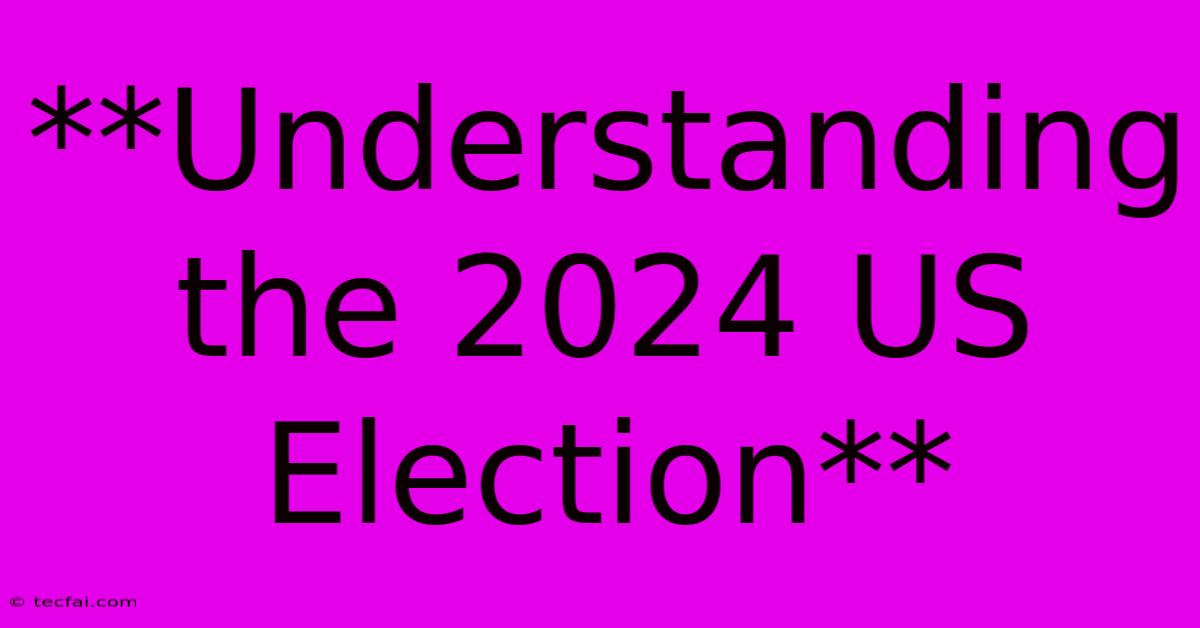**Understanding The 2024 US Election**

Discover more detailed and exciting information on our website. Click the link below to start your adventure: Visit Best Website tecfai.com. Don't miss out!
Table of Contents
Understanding the 2024 US Election: A Comprehensive Guide
The 2024 US Presidential election is rapidly approaching, and with it comes a surge of interest and speculation. Whether you're a seasoned political observer or just beginning to understand the process, navigating the complexities of this crucial event can be overwhelming. This comprehensive guide aims to provide a clear understanding of the key aspects of the 2024 election, empowering you to engage in informed discussions and make informed decisions.
The Election Cycle: From Primaries to Inauguration
The 2024 US Presidential election will unfold across a series of key stages:
- Primaries and Caucuses: These early contests allow voters within each party to choose their preferred nominee. This process typically begins in early 2024, with states holding primaries or caucuses to select delegates who will support a particular candidate at the national convention.
- National Conventions: In the summer of 2024, both major parties will hold their respective national conventions. These gatherings formally nominate the party's presidential and vice-presidential candidates, finalize the party platform, and energize the base.
- General Election Campaign: Following the conventions, the two major party candidates, along with any independent or third-party contenders, will engage in a heated campaign leading up to the general election in November 2024. This period features debates, rallies, and extensive media coverage, as candidates strive to win over voters nationwide.
- Election Day: On the first Tuesday after the first Monday in November 2024, registered voters will cast their ballots for the president and vice-president.
- Electoral College: While popular vote totals are significant, the winner of the presidency is determined by the Electoral College. Each state has a certain number of electoral votes based on its population. The candidate who wins a majority of electoral votes (at least 270 out of 538) becomes the next president.
- Inauguration: The newly elected president and vice-president will be sworn into office on January 20, 2025, marking the official start of their four-year term.
Key Issues Shaping the 2024 Election
The 2024 election will likely be shaped by a range of critical issues that resonate deeply with American voters:
- Economy and Inflation: The current state of the economy, including inflation rates and job market conditions, will be a major focus. Candidates will offer their plans to address these concerns, likely focusing on policies related to taxes, spending, and economic regulation.
- Healthcare: Healthcare costs and access remain a top priority for many voters. Debates surrounding universal healthcare, pre-existing conditions, and drug pricing are likely to dominate the discussion.
- Climate Change: With increasing awareness of the impact of climate change, environmental policies and sustainability initiatives are gaining prominence. Candidates will present their stances on issues like renewable energy, carbon emissions, and conservation.
- Social Justice and Civil Rights: Issues such as racial equity, LGBTQ+ rights, and criminal justice reform are increasingly important to voters. Candidates will be expected to outline their positions on these matters.
- National Security and Foreign Policy: International relations, defense spending, and the ongoing global landscape will also be subject to scrutiny. Candidates will likely engage in debates surrounding alliances, military interventions, and diplomatic strategies.
Staying Informed and Engaged
Understanding the 2024 US Election is crucial for every citizen. To stay informed and engaged, consider these resources:
- Reputable News Sources: Consume news from diverse sources with a history of accuracy and impartiality. Be mindful of bias and misinformation.
- Fact-Checking Websites: Use fact-checking websites to verify information and identify potential inaccuracies.
- Candidate Websites: Explore the official websites of the candidates to understand their positions on key issues and their proposed policies.
- Nonpartisan Organizations: Consult nonpartisan organizations, such as the League of Women Voters, for unbiased information about the election process and candidate profiles.
- Civic Engagement: Participate in town hall meetings, debates, and community forums to engage with candidates and learn about their perspectives.
The 2024 US Presidential election will be a defining moment for the nation. By understanding the key aspects of the election process, the major issues at stake, and the resources available for staying informed, you can actively participate in this crucial democratic process and contribute to shaping the future of the United States.

Thank you for visiting our website wich cover about **Understanding The 2024 US Election**. We hope the information provided has been useful to you. Feel free to contact us if you have any questions or need further assistance. See you next time and dont miss to bookmark.
Featured Posts
-
Monday Night Football Buccaneers Game Updates
Nov 05, 2024
-
Quincy Jones Shaping Americas Sound
Nov 05, 2024
-
Jollibee Tumuloy Sa Pagmamay Ari Ng Tim Ho Wan
Nov 05, 2024
-
Tesla Engineers Stumped By Cybertruck Wreck
Nov 05, 2024
-
Champions League Projections Upcoming Matches
Nov 05, 2024
